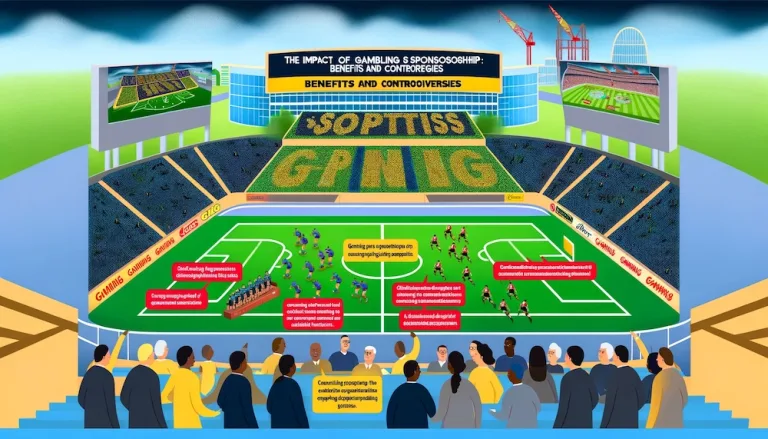Gambling sponsorship has become a prevalent force in the world of sports, providing significant financial support to teams, leagues, and events. This partnership has brought mutual benefits, enhancing the visibility and profitability of both the sports and gambling industries. However, it also raises several ethical and regulatory questions. This article delves into the impact of gambling sponsorship in sports, highlighting the benefits, controversies, and future implications of these partnerships.
The Rise of Gambling Sponsorship in Sports
Financial Support for Teams and Leagues
Gambling companies have become major sponsors in various sports, providing substantial financial support. These sponsorships help cover operational costs, improve facilities, and fund player acquisitions and salaries. The infusion of cash from gambling sponsors has been particularly crucial for smaller teams and leagues that struggle to attract traditional sponsorship deals.
Enhanced Visibility for Gambling Brands
For gambling companies, sports sponsorship offers an excellent platform to reach a wide audience. By associating with popular sports teams and events, gambling brands increase their visibility and appeal to a broader demographic. This exposure helps attract new customers and strengthens brand loyalty among existing players.
Benefits of Gambling Sponsorship
Economic Boost for Sports Organizations
The economic impact of gambling sponsorship on sports organizations is significant. The influx of funds can lead to better training facilities, improved player welfare, and enhanced fan experiences. It also allows teams to invest in community programs and youth development initiatives, fostering the growth of the sport at the grassroots level.
Increased Fan Engagement
Gambling sponsorships often come with interactive and engaging marketing campaigns that enhance the overall fan experience. Promotions, betting opportunities, and branded content can make watching sports more exciting for fans. In-game betting and fantasy sports, for example, add an extra layer of engagement, keeping fans invested in the outcomes of the games.
Cross-Industry Innovation
The collaboration between the gambling and sports industries fosters innovation. Gambling companies bring technological advancements that can be integrated into sports events and broadcasts. For instance, real-time betting odds displayed during live broadcasts and mobile apps that offer seamless betting experiences are direct results of these partnerships.
Controversies and Ethical Considerations
Promoting Gambling to Vulnerable Audiences
One of the primary concerns with gambling sponsorship in sports is the potential promotion of gambling to vulnerable audiences, including minors. Sports events attract a diverse audience, and constant exposure to gambling advertisements can normalize the activity, potentially leading to an increase in gambling addiction among susceptible individuals.
Conflicts of Interest
The close relationship between sports and gambling can lead to conflicts of interest. There is a risk of match-fixing and other unethical practices if players or officials become influenced by gambling entities. Ensuring the integrity of sports events becomes challenging when gambling interests are deeply intertwined with the sport.
Regulatory Challenges
Different countries have varying regulations regarding gambling advertising and sponsorship. Navigating these regulatory landscapes can be complex for both sports organizations and gambling companies. Striking a balance between commercial interests and regulatory compliance is essential to avoid legal issues and maintain ethical standards.
Measures to Mitigate Negative Impacts
Responsible Gambling Initiatives
Gambling companies involved in sports sponsorship should promote responsible gambling practices. This includes setting limits on betting, providing resources for problem gambling, and ensuring that advertisements include messages about gambling responsibly. Sponsorship agreements can incorporate clauses that mandate responsible gambling measures.
Age-Restricted Advertising
To protect younger audiences, sports organizations and gambling sponsors can implement age-restricted advertising. This could involve limiting gambling advertisements during broadcasts to times when children are less likely to be watching and ensuring that promotional content is not targeted at minors.
Transparency and Regulation
Maintaining transparency in sponsorship agreements and adhering to strict regulations can help mitigate potential conflicts of interest. Sports organizations should work closely with regulatory bodies to ensure that all sponsorship activities are conducted ethically and transparently.
The Future of Gambling Sponsorship in Sports
Evolving Regulatory Landscapes
As the relationship between gambling and sports continues to evolve, regulatory frameworks will likely become more stringent. Future regulations may focus on striking a balance between allowing commercial partnerships and protecting vulnerable populations from the negative effects of gambling.
Technological Advancements
Technological advancements will continue to shape the future of gambling sponsorship in sports. Innovations such as augmented reality (AR) and virtual reality (VR) could create more immersive and interactive betting experiences for fans. Additionally, blockchain technology could enhance transparency and security in betting transactions.
Diversification of Sponsorships
The future may see a diversification of sponsorships within the gambling industry. As sports organizations become more aware of the ethical considerations, they might seek partnerships with gambling companies that have strong responsible gambling policies and a commitment to ethical practices.
Conclusion
Gambling sponsorship in sports offers significant financial benefits and opportunities for enhanced fan engagement. However, it also presents ethical and regulatory challenges that must be addressed to ensure the integrity of sports and the protection of vulnerable audiences. By promoting responsible gambling practices, implementing age-restricted advertising, and maintaining transparency, the sports and gambling industries can work together to create a balanced and ethical partnership. As technology and regulations evolve, the future of gambling sponsorship in sports will continue to develop, offering new possibilities and considerations for all stakeholders involved.

Garry Sputnim is a seasoned journalist and storyteller with over a decade of experience in the trenches of global news. With a keen eye for uncovering stories that resonate, Alex has reported from over 30 countries, bringing light to untold narratives and the human faces behind the headlines. Specializing in investigative journalism, Garry has a knack for technology and social justice issues, weaving compelling narratives that bridge tech and humanity. Outside the newsroom, Garry is an avid rock climber and podcast host, exploring stories of resilience and innovation.


